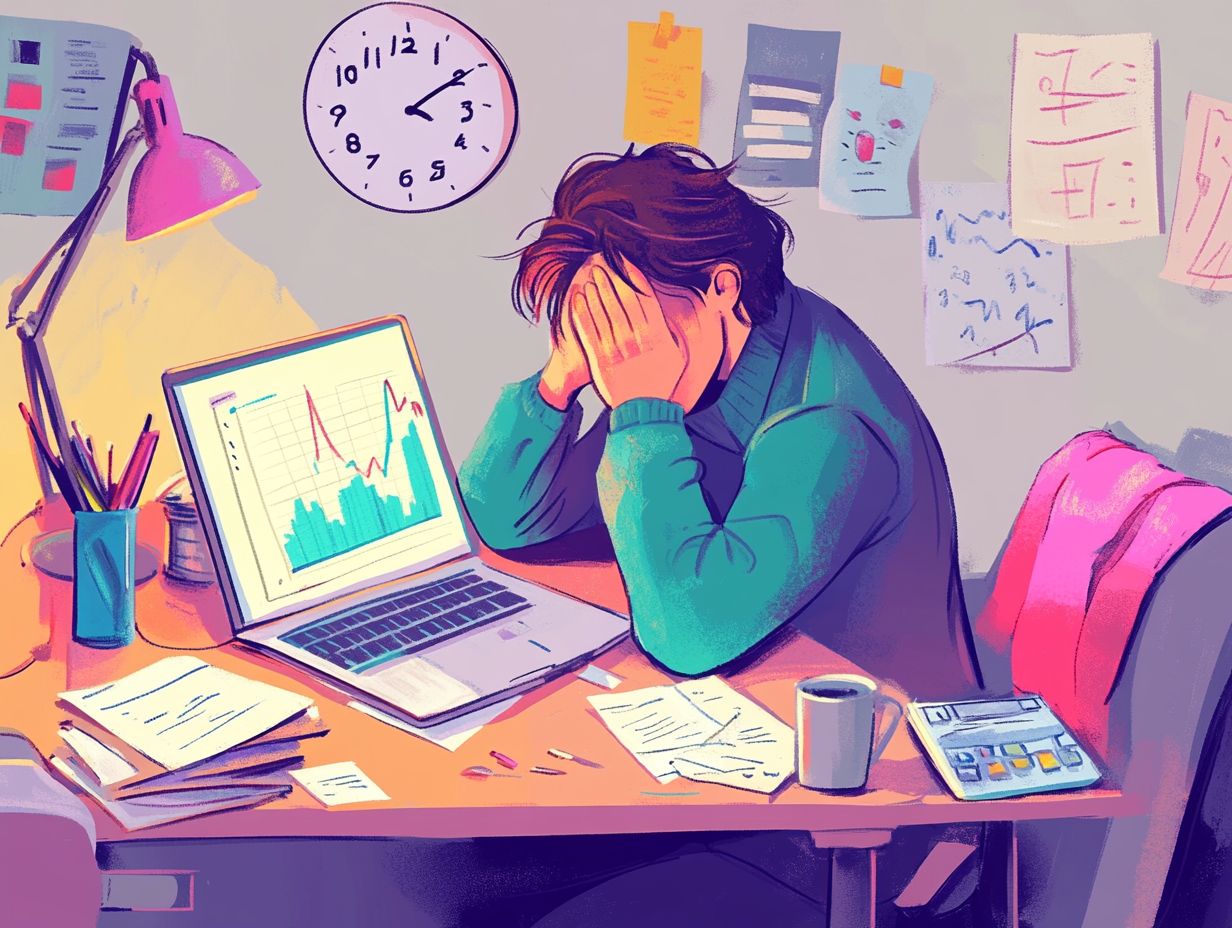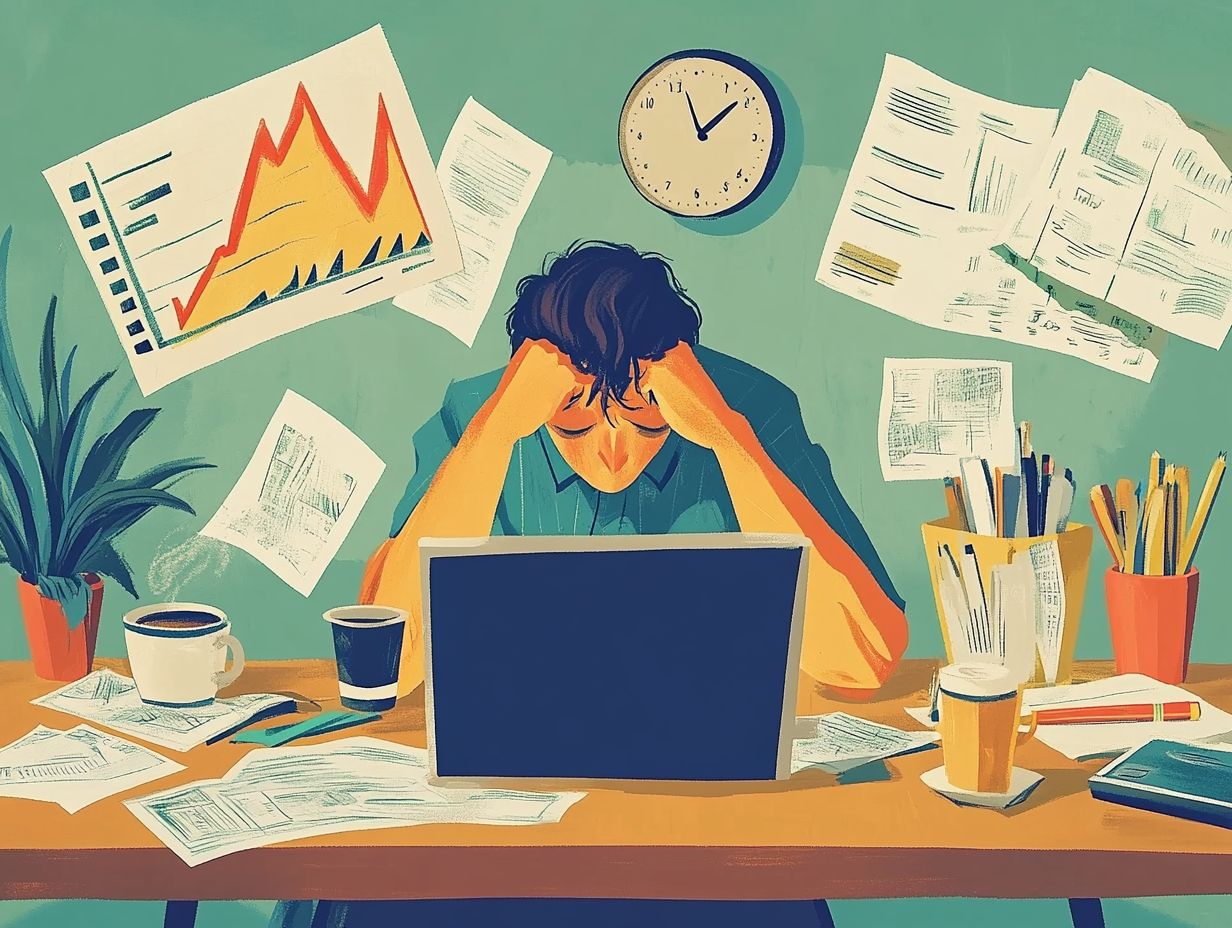The Cost of Burnout: Financial Implications for Freelancers
Freelancing offers flexibility and independence. However, it also comes with challenges, including burnout—a condition affecting many in professional services.
This article explores what burnout means for freelancers, including its signs and symptoms, its potential impact on productivity and income, and effective strategies for prevention and recovery.
By understanding these factors, freelancers can better protect their mental and financial well-being, ensuring a sustainable career. Read on to learn more.
Contents
- Key Takeaways:
- Defining Burnout for Freelancers
- The Financial Impact of Burnout
- Identifying Burnout in Freelancers
- Preventing Burnout in Freelancers
- Recovering from Burnout as a Freelancer
- Frequently Asked Questions
- What is burnout and how does it affect freelancers financially?
- How can burnout impact a freelancer’s income?
- Are there any hidden costs associated with burnout, including recruitment costs and turnover costs for freelancers?
- What are some ways to prevent burnout as a freelancer?
- How can a freelancer recover financially from burnout?
- Is it worth investing in preventing burnout, a psychological phenomenon, as a freelancer?
Key Takeaways:
- Burnout is a state of physical and mental exhaustion that can significantly impact the financial stability of freelancers.
- The financial impact of burnout can result in lost income and reduced productivity, leading to difficulties in meeting financial obligations and achieving financial goals.
- To prevent burnout, freelancers should prioritize self-care, set healthy boundaries, and seek support when needed. Recovery from burnout may involve rebuilding finances and implementing effective coping mechanisms.
Defining Burnout for Freelancers
Burnout is emotional and physical exhaustion that frequently affects freelancers due to prolonged stress and unrealistic workloads. Understanding how burnout impacts freelancers’ mental health is crucial, as it can lead to hidden costs such as decreased performance, high turnover rates, and missed growth opportunities.
These factors can significantly harm freelancers’ careers in the professional services sector.
What is Burnout and How Does it Affect Freelancers?
Burnout among freelancers is marked by emotional exhaustion and long-term stress. It leads to a decline in mental health, primarily driven by the pressures of unpaid work and the harsh realities of an unstable marketplace. This condition can manifest as physical fatigue, emotional detachment, and a pervasive sense of hopelessness.
The absence of traditional job security places freelancers under constant pressure to secure their next project while juggling multiple assignments. This often leads to missed deadlines and diminished creativity.
Consequently, this overwhelming cycle reduces productivity and financial returns, resulting in lost opportunities that could have otherwise translated into increased income. The toll on mental health can be devastating, leaving many freelancers feeling isolated and undervalued.
The Financial Impact of Burnout
Burnout can significantly affect freelancers financially, leading to lost income and decreased productivity. Together, these factors contribute to a true cost of burnout that is often overlooked by both freelancers and their clients.
Lost Income and Reduced Productivity
Burnout significantly affects income loss and productivity, leading to direct financial costs and career challenges for freelancers. The reduced productivity often results in missed deadlines and a diminished capacity to take on work.
A survey by the Freelancers Union revealed that nearly 44% of freelancers experienced a decrease in work capacity due to mental exhaustion, potentially causing an annual income loss of up to $10,000 for some.
Furthermore, ongoing stress increases the risks of anxiety, depression, and other mental health conditions, which can further diminish productivity. Studies have indicated that a 1% rise in mental health issues can lead to a productivity decrease of as much as 2%.
This decline in productivity jeopardizes current contracts and heightens the risk of losing future opportunities. The cyclical nature of these challenges underscores the necessity of prioritizing mental health to ensure financial stability.
Identifying Burnout in Freelancers
Recognizing the signs and symptoms of burnout in freelancers is essential for preventing long-term emotional fatigue and addressing chronic stress. Many freelancers may overlook these indicators due to the independent nature of their work.
Understanding and combating burnout is crucial. Protect your mental health and financial stability now to build a thriving freelance career.
Signs and Symptoms to Look Out For
Signs of burnout in freelancers include emotional exhaustion, lack of recognition, and decreased motivation toward work. These symptoms can lead to a tough cycle of an unhealthy culture that prioritizes relentless productivity over personal well-being.
Emotional exhaustion may manifest as chronic fatigue or a sense of powerlessness. A lack of recognition can lead to feelings of inadequacy or worthlessness. Decreased motivation often stems from a perceived lack of control over workload or deadlines, creating a feedback loop of stress that adversely affects mental health.
Freelancers should also be vigilant for signs of anxiety, irritability, and withdrawal from social situations. These signs often indicate deeper issues related to workload and job satisfaction.
Preventing Burnout in Freelancers
Freelancers can prevent burnout by establishing clear boundaries and fair compensation. Implementing effective coping mechanisms contributes to a healthier work-life balance.
Effective Strategies and Coping Mechanisms
The best strategies and coping mechanisms for freelancers experiencing burnout include utilizing employee assistance programs, which help manage stress and personal issues, prioritizing self-care, and maintaining a healthy work-life balance.
Incorporating effective time management strategies also helps alleviate stress. For instance, the Pomodoro Technique involves focused work periods of approximately 25 minutes followed by short breaks of about 5 minutes. This enhances productivity while preventing fatigue and burnout.
Setting boundaries is crucial. Establishing designated work hours creates a structured environment. Joining support groups or online communities for freelancers is another effective way to combat burnout. These platforms allow individuals to share experiences and recommendations.
By implementing these strategies, freelancers can maintain their mental and emotional well-being, which contributes to career progression and leads to a more enjoyable work experience.
Recovering from Burnout as a Freelancer
Recovering from burnout involves a combination of rebuilding finances, strengthening mental health, and implementing proactive measures for future stability.
Steps to Take for Recovery and Rebuilding Finances
The steps taken for recovery and rebuilding finances after experiencing burnout can significantly affect a freelancer’s mental health and future financial success. Understanding one’s mental health needs is crucial, especially due to the dual pressures of tight deadlines, long working hours, and inconsistent income.
To navigate this difficult period, freelancers may begin by:
- Reevaluating their current contracts to identify projects that align with their strengths and passions. Ensure these projects are appropriately priced.
- Developing a comprehensive financial strategy that includes both short-term and long-term budgets for stability.
Regular mental health checkups and establishing a healthy work-life balance are also vital for improving mental well-being. This ultimately contributes to a more sustainable freelance career in the long run.
Frequently Asked Questions
What is burnout and how does it affect freelancers financially?
Burnout is a state of physical, emotional, and mental exhaustion caused by long-term stress and overwork. For freelancers, it can lead to financial implications such as decreased productivity, missed deadlines, and potential loss of clients.
How can burnout impact a freelancer’s income?
Burnout is a state of emotional, physical, and mental exhaustion caused by prolonged stress. It reduces productivity. This directly lowers a freelancer’s income.
Burnout may also lead a freelancer to take on less work. This can result in missed deadlines and a loss of potential income from clients.
Yes, burnout can create hidden costs beyond lost income. These costs may include medical bills for physical and mental health treatment.
Additionally, burnout can lead to decreased motivation, creativity, and potential damage to a freelancer’s reputation and brand.
What are some ways to prevent burnout as a freelancer?
Some effective ways to prevent burnout include setting boundaries and taking regular breaks. Practicing self-care and learning to say no to overly stressful projects is also essential.
Prioritizing tasks and managing your time effectively is crucial. Don’t let overwhelm hold you back!
How can a freelancer recover financially from burnout?
If a freelancer has faced financial implications due to burnout, prioritizing self-care is vital. Seeking help if needed is also important.
Once ready, the freelancer can gradually ease back into work. It’s helpful to communicate with clients about any missed deadlines or potential delays.
Adjusting rates to compensate for lost income can be beneficial. Avoid taking on too much work immediately.
Is it worth investing in preventing burnout, a psychological phenomenon, as a freelancer?
Absolutely! Investing time and effort into preventing burnout can save freelancers from potential financial implications in the long run.
Ignoring burnout can lead to serious issues like high turnover and health problems. The hidden costs include emotional exhaustion and unrealistic workloads that create a lack of recognition and isolation at work.
Taking care of yourself is not just an option; it’s essential for success in your freelance journey! Prioritizing your physical and mental health can lead to increased productivity, better quality work, and a more sustainable freelance career.










